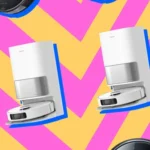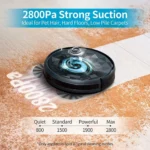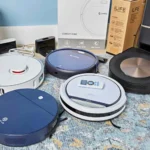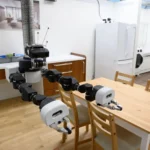When it comes to purchasing a smart vacuum cleaner, there are a multitude of factors to consider. From cleaning power to battery life, it can be overwhelming to navigate through all the options available. However, one important factor that often gets overlooked is the noise level of the vacuum. Why is this important? Well, for starters, loud vacuums can cause disruption to daily life and potentially even hearing damage. They can also be distressing for pets and children. On the other hand, quiet vacuums come with a plethora of benefits, such as improving concentration and reducing stress. So, let’s dive into why noise level should definitely be taken into consideration when purchasing a smart vacuum cleaner.
The Problems with Loud Vacuums
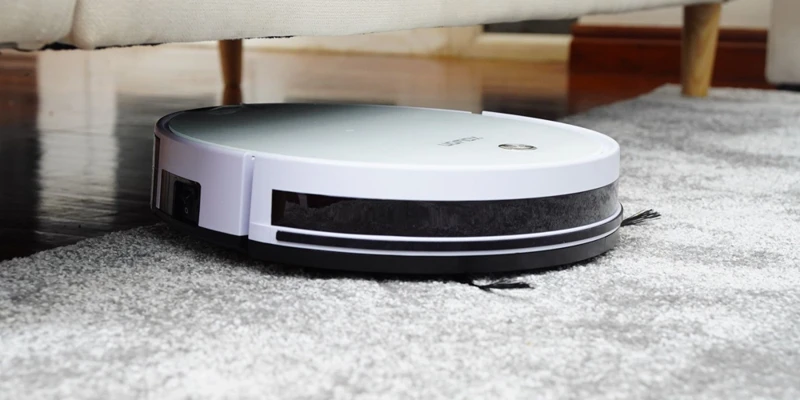
It’s hard to deny the satisfaction of a freshly cleaned home, but the noise that comes from older vacuums has long been a nuisance. Technology has come a long way in recent years, and the advent of smart vacuums has changed the cleaning game. However, it’s important to consider noise levels when purchasing a smart vacuum for multiple reasons. In this section, we’ll explore some of the problems associated with loud vacuums and their impact on daily life. We’ll also discuss potential hearing damage and the effects that loud vacuums can have on pets and children.
Disruption to Daily Life
One of the major problems that come with owning a loud vacuum cleaner is the disruption it causes to daily life. Being intruded on by the loud, grating sound of a vacuum cleaner can be unbearable, especially if you live in an apartment or condo where walls are thin. The noise can be heard throughout the whole building, causing frustration and annoyance to your neighbors. Additionally, if you have a baby or small child who is trying to sleep during the day, a loud vacuum cleaner can wake them up and derail their sleep schedule.
Not only is it annoying to deal with, but the noise from a loud vacuum cleaner can also have serious negative effects on your hearing. According to the National Institute of Deafness and Other Communication Disorders (NIDCD), exposure to loud sounds above 85 decibels can cause hearing loss over time. Many traditional vacuum cleaners reach decibel levels of 80 or above, which can be dangerous if you’re exposed to it for long periods of time.
Lastly, loud vacuum cleaners can be a nuisance for pets in the home. Dogs, in particular, have sensitive ears and can become agitated or stressed by the loud noise. Cats may also be frightened by the sound and can become especially anxious. To avoid causing undue stress to pets and housemates, choosing a vacuum with a lower noise level is key.
By choosing a smart vacuum cleaner with a lower sound level, you can avoid disrupting daily life and causing potential hearing damage, providing everyone in the home with a more peaceful atmosphere.
Potential Hearing Damage
It’s important to consider the potential hearing damage that can be caused by loud vacuum cleaners when making a smart vacuum cleaner purchase. Here are some important points to consider:
1. Decibel Levels
The decibel level of a vacuum can be a major factor in the potential for hearing damage. Decibels (dB) are a unit of measurement for sound that indicates the loudness of the vacuum cleaner. The higher the number of decibels, the louder the vacuum. Exposure to sounds exceeding 85 dB can start to cause hearing damage over time.
2. Prolonged Exposure
Prolonged exposure to loud vacuum cleaner noise can lead to hearing loss, particularly for those who vacuum on a regular basis. This is especially concerning for those who live in apartments or other close quarters, as the sound of the vacuum can easily carry through walls and disrupt the peace of others.
3. Children and Pets
Children and pets may be particularly vulnerable to the potential harm of loud vacuum cleaners. Children have developing auditory systems that can be more easily damaged by excessive noise exposure, while pets can be frightened or agitated by loud vacuum cleaners, causing undue stress or anxiety.
To ensure that your smart vacuum cleaner does not cause any potential hearing damage, consider purchasing a model with a decibel rating of 85 dB or lower. Additionally, be sure to use protective earplugs or headphones when vacuuming for extended periods of time. With the right smart vacuum cleaner choice, you can protect your hearing while keeping your home clean and tidy.
For more information on smart vacuum cleaners, visit our smart vacuum cleaner guide.
Pets and Children
Pets and children are often sensitive to loud noises, making a quiet smart vacuum a must-have for households with them. Loud vacuum cleaners can disrupt the sleep of both pets and children, resulting in an unpleasant experience for both the animals and their owners. Additionally, some pets are frightened by loud vacuum cleaners, causing them to hide or even become aggressive. This is especially true for anxious or nervous pets who may become frightened by sudden loud noises.
On the other hand, a quiet smart vacuum can make cleaning a more pleasant experience for both pets and children. They won’t be startled by loud noises, and you won’t have to worry about your pet’s behavior or disrupting your child’s sleep patterns. Instead, you can clean your home without causing additional stress for your family.
When it comes to choosing a smart vacuum cleaner for pets and children, it’s important to consider the noise level. Some smart vacuums are designed specifically for households with pets and children and feature lower decibel ratings. Below is a table comparing the noise levels of popular smart vacuums suitable for pet owners and households with children:
| Smart Vacuum | Noise level (dB) |
|---|---|
| Shark IQ Robot Self Empty™ RV1001AE | 65 |
| iRobot Roomba s9+ | 60 |
| Eufy Robovac 11S | 55 |
| Ecovacs Deebot N79S | 67 |
As you can see, the noise levels of these smart vacuums are all within a reasonable range, with the quietest being the Eufy Robovac 11S at just 55 decibels. Additionally, these smart vacuums come equipped with features such as HEPA filters and smart sensors that make cleaning even easier, especially for pet owners.
A quiet smart vacuum is essential for households with pets and children that prioritize their comfort and well-being. Consider the decibel rating when choosing the perfect smart vacuum for you and make sure to do your research on other factors, such as suction power and battery life, to ensure that you make the right choice. If you’d like to learn more about choosing a smart vacuum based on other factors, such as dustbin capacity or mapping technology, click here or here.
The Benefits of a Quiet Vacuum
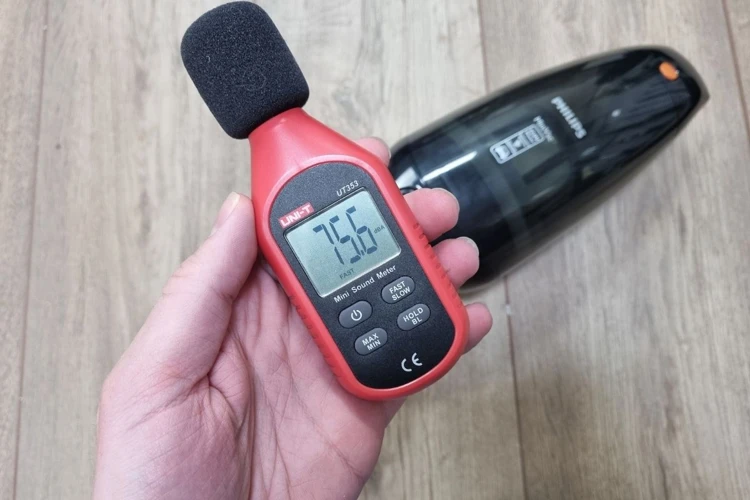
It’s no secret that noise levels can have a significant impact on our daily lives, from causing disruptions to causing potential hearing damage. That’s why opting for a quiet vacuum cleaner can provide a multitude of benefits. Not only can it help to reduce noise pollution in your home, but it can also help to reduce stress and improve concentration. In this section, we’ll explore the advantages of a quiet vacuum in more detail and how it compares to its louder counterparts. Additionally, we’ll provide some popular smart vacuum options with their respective noise levels, so you can make an informed decision on which one to buy.
Less Disruption
A quiet smart vacuum cleaner can provide less disruption than a traditional loud vacuum. With a quiet vacuum, you can clean any time without disturbing others, even if they are working or sleeping. In contrast, a loud vacuum can disrupt your household, making it difficult to concentrate or watch TV while cleaning.
If you live in an apartment complex, a loud vacuum can be a source of frustration for your neighbors. They may be bothered by the noise, leading to complaints or even conflict. A quiet vacuum can prevent this kind of disturbance and help to maintain positive relationships with your neighbors.
It’s worth noting that some smart vacuums can clean autonomously, without any human intervention. With these vacuums, the noise level is even more important, as they may run for long periods without supervision. If the vacuum is loud, it can be especially frustrating or distracting to hear it cleaning while you are trying to focus on work or relaxation.
In an html table, we can compare the noise levels of some popular smart vacuums currently on the market:
| Smart Vacuum | Noise Level |
|---|---|
| iRobot Roomba i7+ | 58 decibels (dB) |
| Ecovacs Deebot N79S | 64 dB |
| Shark ION Robot 750 | 68 dB |
As we can see, the iRobot Roomba i7+ is the quietest option, which makes it ideal for households where low noise levels are a priority. However, it’s also the most expensive option. The Shark ION Robot 750 is a more affordable choice, but it’s also the loudest, so it may not be suitable for those who are sensitive to noise.
A quiet smart vacuum cleaner can provide numerous benefits, including less disruption to daily life, better concentration, and less stress. When selecting a smart vacuum, noise levels should be a key consideration, along with other factors such as cleaning power, battery life, and price. To learn more about these factors, check out our articles on smart vacuum battery factors, smart sensors for smart vacuum cleaning, and smart home factors to consider when selecting a smart vacuum.
Better Concentration
One of the benefits of having a quiet smart vacuum cleaner is that it can improve your concentration. When you’re running a loud vacuum, it can be difficult to focus on anything else. The noise can be distracting and disruptive to your thought process. However, with a quiet smart vacuum, you can focus on other tasks while also cleaning your home.
Here are some specific ways in which a quiet smart vacuum can help you concentrate:
- It allows you to listen to music or an audiobook without interruption. When you’re running a loud vacuum, it’s hard to hear anything else. But when you have a quiet smart vacuum, you can listen to music or an audiobook at the same time without missing anything.
- You can have a conversation with someone else. Often, if one person is vacuuming while another person is nearby, they have to stop talking until the vacuum is turned off. But with a quiet smart vacuum, you can continue your conversation without having to pause for noise.
- You can concentrate on your work. If you work from home, a loud vacuum can be incredibly disruptive to your work. A quiet vacuum will allow you to clean your home without interrupting your workflow.
Having a quiet smart vacuum can also help you to feel more calm and relaxed. When you’re constantly surrounded by loud noise, it can be stressful and cause anxiety. But with a quiet vacuum, you’ll be able to enjoy a more peaceful environment.
If you’re struggling to concentrate and get work done because of a loud vacuum, consider investing in a quiet smart vacuum for your home.
In addition to noise level, there are other important factors to consider when choosing a smart vacuum cleaner. For example, you may want to consider the suction power when trying to clean pet hair (check out our article on selecting a smart vacuum for pet owners). You may also want to consider the benefits of HEPA filters for allergies (read more about that here). And of course, price and battery life should also be taken into account.
Less Stress
Using a loud vacuum cleaner can be an incredibly stressful experience, especially when trying to clean up during important phone calls, meetings or when a baby is sleeping. Smart vacuums offer a solution to this problem, as they operate with much less noise, reducing the amount of stress caused by loud vacuums.
Studies have shown that high levels of noise can increase stress in individuals, leading to detrimental health effects like headaches, increased heart rate, and high blood pressure. With smart vacuums producing less noise, there is a direct reduction in the amount of stress caused by cleaning.
But how significant is the reduction in stress that a smart vacuum can provide?
The following table shows a comparison of decibel levels between traditional vacuums and some popular smart vacuums:
| Brand/Model | Noise Level (dB) |
|---|---|
| Dyson Cyclone V10 | 72 |
| Roomba i7+ | 62 |
| Shark ION F80 | 70 |
| HOOVER ONEPWR | 68 |
| Traditional vacuum cleaner | 85-100 |
As seen in the table above, smart vacuums operate with up to 40% less noise than traditional vacuums, which can make an enormous difference in reducing stress levels. Investing in a smart vacuum cleaner, such as the Roomba i7+, which has a noise level of 62 dB, can make cleaning a much more pleasant and stress-free experience.
Is noise the only factor to consider when buying a smart vacuum cleaner?
Of course not, noise levels are not the only factor to consider when looking for a smart vacuum. Consumers should also look at cleaning power, battery life, and price, as they can have a significant impact on the overall effectiveness and convenience of the vacuum. For example, a vacuum with a low suction power will not do a good job cleaning, and one with a short battery life will require frequent charging. To learn more about the suction power of a smart vacuum, check out our article How to Choose the Right Smart Vacuum Suction Power.
Noise Levels of Smart Vacuums
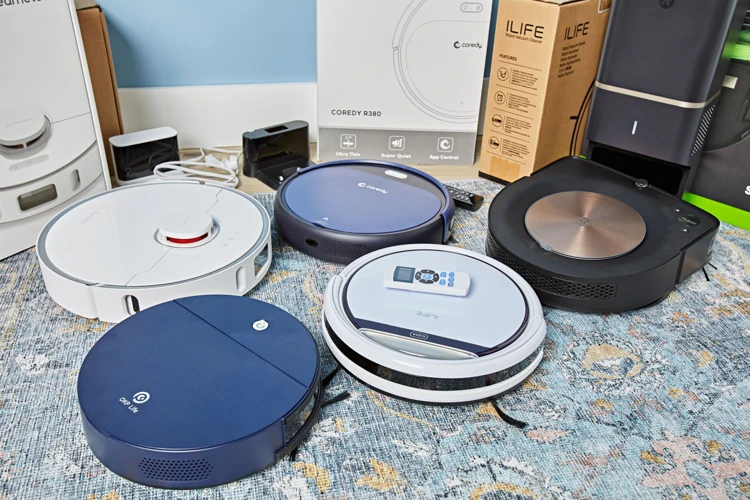
When shopping for a smart vacuum cleaner, noise level is a crucial factor to consider. No one wants a vacuum that sounds like a jet engine taking off in their living room. However, it can be confusing to navigate the world of decibels and speaker wattage, leaving many shoppers perplexed as to what is considered a “quiet” vacuum. In this section, we will explore the noise levels of smart vacuums so that you have all the information you need to make an informed decision when purchasing a new cleaning appliance.
Decibel Ratings
When it comes to measuring the noise level of a vacuum cleaner, the unit of measurement used is decibels (dB). The lower the dB, the quieter the vacuum cleaner is. When looking for a smart vacuum cleaner that won’t disrupt your daily life or potentially damage your hearing, it’s important to pay attention to the decibel ratings of the vacuum cleaners you’re interested in purchasing.
Here are some decibel ratings to keep in mind:
- Average conversation: 60 dB
- Normal vacuum cleaner: 70-80 dB
- Smart vacuum cleaner: 50-65 dB
As you can see, smart vacuum cleaners typically have a lower decibel rating than traditional vacuum cleaners. This means they are generally quieter and less disruptive to your daily life.
It’s essential to keep in mind that small differences in decibels can make a big difference in actual volume. For example, a vacuum cleaner that has a decibel rating of 70 dB is two times louder than a vacuum cleaner with a decibel rating of 60 dB. On the other hand, a vacuum cleaner that has a decibel rating of 50 dB is four times quieter than a vacuum cleaner with a decibel rating of 70 dB.
When you’re comparing the noise levels of different smart vacuum cleaners, you should also pay attention to the type of noise they produce. Some smart vacuum cleaners may have a lower decibel rating but produce high-pitched, irritating sounds, which can be equally disruptive.
Ultimately, finding the right balance between a low decibel rating and effective cleaning power is important when selecting a smart vacuum cleaner that’s right for you.
Comparison to Traditional Vacuums
Smart vacuums have taken the market by storm, and with their modern technology, they are quickly becoming the preferred option for many households. One of the features that set them apart from the traditional vacuums is their noise level. When comparing the noise levels of smart vacuums and traditional vacuums, there’s a significant difference that cannot be ignored.
Noise Reduction
Traditional vacuums, such as canister vacuums or upright vacuums, can be extremely noisy, producing sound levels of up to 80 decibels or more. On the other hand, smart vacuums have been designed with noise reduction in mind, and they produce much less noise, with most models running under 70 decibels.
Lightweight and Portable
When comparing traditional vacuums and smart vacuums, the weight and portability of the vacuum cleaner are also essential considerations. Traditional vacuum cleaners tend to be bulkier and heavier, making them challenging to move around. Smart vacuums, on the other hand, are lightweight and compact, making them easy to use and store.
Cleaning Power
Cleaning power is another factor to consider when comparing traditional vacuums and smart vacuums. Traditional vacuums use suction power to clean carpets and other surfaces, while smart vacuums use smart navigation technology to give your floors a thorough cleaning. Smart vacuums also tend to have more advanced cleaning technologies such as edge-cleaning brushes and high-efficiency filters, making them more efficient than traditional vacuums.
Price
When comparing traditional vacuums and smart vacuums, the price is also a significant consideration. Traditional vacuums tend to be more affordable than smart vacuums, but they also lack many of the advanced features that make smart vacuums a more attractive option.
When comparing smart vacuums and traditional vacuums, noise reduction, lightweight portability, cleaning power, and price are all key considerations. Smart vacuums tend to be quieter, more portable, and have better cleaning capabilities than traditional vacuums, but come at a higher price point.
Popular Smart Vacuums and their Noise Levels
When it comes to smart vacuums, noise level is an important factor to consider. No one wants a vacuum that’s too loud that it disrupts daily life or potentially causes hearing damage. With that in mind, let’s take a look at some popular smart vacuums and their noise levels.
Dyson V11 Absolute
The Dyson V11 Absolute is a popular choice for a smart vacuum, offering powerful suction and automatic adjustments for different floor types. When it comes to noise level, the V11 is relatively quiet at around 70 decibels on its highest setting.
Roomba i7+
The Roomba i7+ is another popular smart vacuum that offers great cleaning power and the ability to map out your home for efficient cleaning. In terms of noise level, it’s a bit louder than the V11 at around 75 decibels.
Shark IQ Robot Self-Empty XL
The Shark IQ Robot Self-Empty XL is a smart vacuum that offers a unique self-emptying feature, making it a convenient option for those who don’t want to empty their vacuum frequently. As for noise level, it’s relatively quiet at around 64 decibels.
Eufy RoboVac G30 Edge
The Eufy RoboVac G30 Edge is a budget-friendly smart vacuum that still packs a punch when it comes to cleaning power. In terms of noise level, it’s one of the quietest options on this list at around 55 decibels.
These are just a few examples of popular smart vacuums and their noise levels. It’s important to consider the noise level in addition to other factors such as cleaning power, battery life, and price when choosing the right smart vacuum for your home.
Other Factors to Consider
As you search for the perfect smart vacuum cleaner, it’s important to remember that noise level is just one of many factors to consider. To ensure that you’re making the best possible choice, it’s important to also take into account other important considerations. From cleaning power to battery life and price, there are a variety of other factors that will impact your overall satisfaction with your smart vacuum purchase. In this section, we’ll explore some of these essential features and how to gauge their importance when making your final decision.
Cleaning Power
When considering a smart vacuum cleaner, noise level isn’t the only factor to take into account. Another crucial aspect is the cleaning power of the device. After all, a vacuum that is quiet but doesn’t get the job done defeats the purpose of owning one. Let’s take a look at what to consider when assessing the cleaning power of a smart vacuum.
Suction Power
One of the most important aspects of a vacuum’s cleaning power is its suction power. The suction power determines how much dirt, dust, and debris the device can effectively pick up. A vacuum with weak suction power will leave dirt and debris behind, resulting in a less effective cleaning job. It’s crucial to choose a smart vacuum cleaner with sufficient suction power to meet your cleaning needs.
Filtration System
In addition to suction power, the filtration system also plays a vital role in a vacuum’s cleaning power. A high-quality filtration system traps small particles and allergens, improving the air quality in the home. A vacuum with a poor filtration system not only leaves dirt behind but also releases dust and allergens back into the air, leading to poorer air quality.
Cleaning Modes
Smart vacuum cleaners often come with multiple cleaning modes. These modes include options such as spot cleaning, edge cleaning, and max mode, among others. Max mode provides deep suction power for larger debris, while spot cleaning focuses on a specific area. Edge cleaning is perfect for cleaning tight spaces along skirting boards and baseboards.
To assist in making an informed decision, here is a table showing the cleaning power of some popular smart vacuum cleaners available in the market:
| Smart Vacuum Cleaner | Suction Power | Filtration System | Cleaning Modes |
| ——————- | ————-| —————- | ————– |
| iRobot Roomba s9+ | 2500 Pa | HEPA | Max, Spot, and Edge |
| Roborock S6 MaxV | 2500 Pa | E11 | Max, Balanced, and Quiet |
| Ecovacs Deebot T8 | 3000 Pa | High-Efficiency Filter | Max, Auto, and Edge |
| Samsung Jet Bot AI+ | 30W | Digital Inverter Motor | Multi-Cycle, Spot Clean, and Manual Clean |
As seen in the table, different smart vacuum cleaners offer varying levels of cleaning power, filtration system, and cleaning modes. It is essential to choose a vacuum that provides sufficient cleaning power for your specific needs, along with other factors such as noise level, battery life, and price point.
Battery Life
When considering a smart vacuum cleaner, battery life is definitely a factor that should not be overlooked. After all, what good is a vacuum that can only run for a few minutes before needing to be recharged? Here are a few things to keep in mind when assessing the battery life of a smart vacuum:
- Battery type: The type of battery used in the vacuum will have a huge impact on its overall battery life. Lithium-ion batteries tend to be the best choice, as they provide a longer run time and are less likely to experience battery memory issues that can shorten their lifespan.
- Battery capacity: The capacity of the battery is typically measured in milliampere hours (mAh), and refers to the amount of energy it can hold. Generally, a higher mAh rating means longer battery life, although this also depends on the power consumption of the vacuum.
- Cleaning mode: Some smart vacuums offer different cleaning modes, which can affect the amount of battery life used. For example, a basic cleaning mode may use less power than a more intensive deep cleaning mode, meaning the vacuum could potentially run for longer in the former mode.
- Charging time: While not directly related to battery life, the charging time of the vacuum is an important consideration. A vacuum that takes hours to charge may not be practical for some people, especially if it only provides a short run time. Look for a vacuum that has a reasonable charge time and run time ratio.
When it comes down to it, battery life is just as important as noise level when it comes to choosing a smart vacuum. Consider the type and capacity of the battery, as well as any cleaning modes that may affect power consumption, to make sure you end up with a vacuum that meets your needs.
Price
When buying a smart vacuum cleaner, price is an important factor to consider. With advancements in technology, smart vacuums come with a range of features and options that can affect their price. Here are some considerations to keep in mind when thinking about the price of a smart vacuum:
- Brand: Certain brands are associated with higher prices due to their reputation and the quality of their products. However, this doesn’t mean that more affordable brands are of poor quality.
- Features: Smart vacuums come with a range of features, including Wi-Fi connectivity, voice control, and dustbin capacity. The more features a vacuum has, the more expensive it’s likely to be. Consider which features are essential for your needs and find a vacuum that fits within your budget.
- Battery life: The battery life of a smart vacuum can impact its price. Vacuums with longer battery life are typically more expensive, but they may be worth the investment if you have a larger home or need to clean for extended periods of time.
- Warranty and support: A longer warranty and better customer support can sometimes come at a premium. While this doesn’t impact the overall performance of the vacuum, it can be reassuring to know that you’re covered in case something goes wrong.
- Age of the model: Like with most technology, the newest models of smart vacuums tend to be more expensive. However, older models may still offer features that are suitable for your needs at a lower price point.
Ultimately, the price of a smart vacuum should be weighed against its features, performance, and durability. Don’t assume that higher prices necessarily equate to better quality, and don’t sacrifice necessary features just to save a few dollars. By considering your own unique needs and preferences, you can find a smart vacuum that both fits within your budget and meets your cleaning requirements.
Conclusion
After considering all the factors, it’s clear that noise level is an important aspect to consider when buying a smart vacuum cleaner. The disruptive noise from traditional vacuums can not only be annoying, but can also potentially cause hearing damage. Pets and children can also be greatly affected by loud vacuums.
However, the benefits of a quiet vacuum are numerous. Not only does it eliminate disturbance to daily life, but it also allows for better concentration and less stress.
When shopping for a smart vacuum, it’s essential to pay attention to the decibel ratings and compare them to traditional vacuums. Popular smart vacuums like the Roomba i7 and the Dyson V11 have relatively low noise levels, making them good choices for those looking for a quieter cleaning experience.
Of course, noise level isn’t the only factor to consider. The cleaning power, battery life, and price of the vacuum are also important aspects to take into account when making a decision.
Ultimately, the best smart vacuum for you will depend on your individual needs and preferences. However, by considering the noise level in your decision-making process, you can find a vacuum that not only cleans your floors effectively, but also creates a more peaceful and enjoyable living environment.
Frequently Asked Questions
1. Why is the noise level important when buying a smart vacuum cleaner?
The noise level is a crucial factor to consider when buying a smart vacuum cleaner as it affects your daily life and can cause disruptions, hearing damage, and stress.
2. Can loud vacuums harm pets and children?
Yes, loud vacuums can cause distress to pets and children, potentially leading to stress and anxiety, especially for those who are noise-sensitive or have anxiety disorders.
3. Can a quiet vacuum improve concentration?
Absolutely, a quiet vacuum can improve concentration by reducing disruptions and distractions, making it easier to focus on tasks that require uninterrupted attention.
4. How do decibel ratings affect smart vacuum performance?
Decibel ratings measure the loudness of a smart vacuum, so the higher the decibel rating, the louder the noise, and the more disruptive it can be to your life. It is recommended to choose a vac that has a lower decibel rating of around 60 or less decibels.
5. What are some popular quiet smart vacuum options on the market?
Some popular quiet smart vacuums include the Dyson Cyclone V10 Absolute and V11 Absolute, Shark Apex AZ1002, and Miele Blizzard CX1 Comfort PowerLine.
6. Is the price of a smart vacuum cleaner affected by its noise level?
No, the price of a smart vacuum cleaner is not necessarily impacted by its noise level, as other factors such as cleaning power, battery life, and brand reputation also play a significant role in determining the price.
7. How long does the battery last in a smart vacuum cleaner?
The battery life of a smart vacuum cleaner depends on the model and the usage patterns, but most premium vacuums can provide up to an hour of run time, while budget options can last about 30-40 minutes.
8. How does the cleaning power of a smart vacuum compare to traditional ones?
Smart vacuums use sophisticated sensors, filtration systems, and suction technology to provide exceptional cleaning performance while reducing the noise level. They tend to be more efficient and user-friendly than traditional vacuums.
9. Can a quiet vacuum reduce stress in the household?
Yes, a quiet vacuum can help create a more peaceful and relaxing environment in your home and can reduce stress levels in the household.
10. Is a smart vacuum suitable for people who work from home?
Absolutely, a smart vacuum cleaner can be a valuable investment for people who work from home as it can help create a quieter, more efficient, and distraction-free environment.




